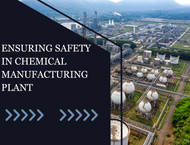A Deep Dive into Ensuring Safety in Chemical Manufacturing Plant
Posted by David Cannon on 21st Jan 2024

In the world of making chemicals, where things need to be just right, one big thing we can't forget is safety. For folks dealing with chemical manufacturing plants, safety isn't just a duty; it's a must for keeping things going well.
This article talks about how important safety is in making chemicals, pointing out the risks, best ways to do things, and how vital safety is for companies to do well in this complex field. Stick around, and we'll look at some products that make these places safer.
Utilizing Reliable Equipment for Safety Assurance in Chemical manufacturing plants
In simple terms, making safety a top priority doesn't just avoid problems but also helps things run better in chemical plants.
- Full Protection: Safety is like a strong shield, looking out for the workers and keeping away possible dangers.
- Smoothing Out Work: Following careful safety rules makes work smoother, cutting down on problems and making everything run better.
- Less Downtime: Being proactive about safety lowers the chances of unexpected breaks, keeping production schedules steady and efficient.
- More Productivity: A safe and careful workplace boosts positivity, making workers more productive.
- Saving Resources: By stopping accidents and cutting down waste, safety helps use resources wisely, saving money and boosting efficiency.
- Following Rules: Strictly sticking to safety rules makes sure a company follows industry rules, avoiding fines and legal problems.
6 Dangers of Not Enough Safety in Chemical Plants
In the lively and complex world of chemical plants, not paying attention to safety rules can bring serious dangers. From big explosions to hidden corrosion and problems in high-pressure spots, having thorough safety measures is a must.
Looking closely at these dangers shows how they can mess up not just work but also the safety of people and the way industrial things work. Let's check them out:
1.Explosions: Ignoring safety can lead to explosive situations, putting workers and the whole place at risk.
2.Corrosion Problems: Skipping safety steps raises the chance of corrosion, harming the strength of tools and buildings.
3.High-Pressure Risks: Not doing safety right in high-pressure spots can mean tools break and accidents happen.
4.Hygiene Issues: Lack of safety might lead to bad hygiene, risking worker health.
5.Boiler Safety Problems: Not being careful with boilers can lead to issues, leaks, and dangers.
6.Water Quality Issues: Without good safety, water sources might get dirty, hurting both the environment and how things work.
Adding Safety Products to improve Chemical Plant Performance
In the complex world of making chemicals, making a safe workplace is super important. Special tools for safety, made just for chemical plants, do a big job in protecting against problems and unexpected situations. From smart monitoring tools to exact safety gear, these things not only follow rules but also work ahead to lower risks and make the whole place safer.
Making Boiler Safety Better with Smart Solutions
Ensuring the safety of boilers is critical in chemical manufacturing, given their vital role in various processes. Boilers, while essential, pose risks such as leaks, necessitating vigilant monitoring. Key components in this safety approach include Boiler Sample Coolers, enhancing boiler performance, and Water Quality Meters, ensuring water safety in chemical processes. These tools, complemented by intelligent monitoring systems, play a crucial role in averting potential hazards and maintaining the optimal operation of chemical plants.
Boiler Sample Coolers efficiently cool water or steam samples, facilitating precise analysis to prevent issues like corrosion. Simultaneously, Water Quality Meters contribute to a secure industrial environment by accurately measuring parameters such as chlorine, conductivity, and pH, ensuring precise water quality control in chemical production.
Ensuring Hygiene Standards in Chemical Industrial Plants
In chemical industrial settings, the presence of microscopic organisms like bacteria and fungi can lead to significant issues, compromising cleanliness and safety. Implementing robust safety measures to prevent the proliferation of these microorganisms is crucial for maintaining a clean, safe, and healthy workplace.
Products like Brominators and Biocide Feeders significantly contribute to preventing the spread of harmful bacteria and contaminants in industrial environments. Brominators introduce bromine, a potent cleaner, into the water, while Biocide Feeders release controlled biocides, inhibiting the growth of living organisms.
In addition, managing chlorine levels is essential for maintaining a controlled and safe environment in industrial settings. Chlorine neutralizers play a key role in preventing potential issues caused by excess chlorine. Additionally, the incorporation of cooling tower chemicals further enhances safety by addressing concerns such as scale formation and corrosion in industrial processes.
Managing High-Pressure Risks in Chemical Plants
High-pressure situations in chemical plants, occurring during significant operations, reactions, or within specialized tools like reactors and pipelines, demand meticulous handling for safety and operational efficiency. Proper management of high pressure is crucial for ensuring the safety of personnel, safeguarding tools, and maintaining optimal functionality.
Pressure relief valves are pivotal components ensuring safety in chemical industries by preventing excessive pressure build-up in tools and pipelines. These valves automatically open when pressure reaches unsafe levels, safeguarding tools and personnel from potential hazards.
In conclusion, the integration of safety measures, products, and protocols in chemical manufacturing is not only a regulatory requirement but a strategic imperative for fostering a secure, efficient, and sustainable industrial landscape. The commitment to safety reflects not just responsible business practices but a commitment to the well-being of personnel, the integrity of processes, and the long-term success of chemical manufacturing enterprises.
